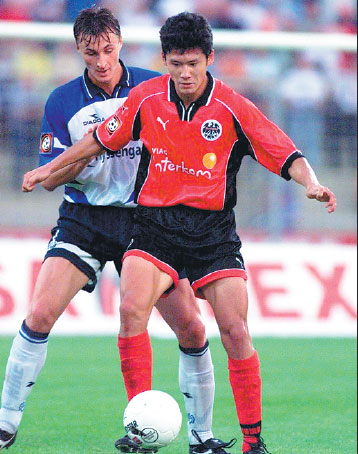Germany's game is China's gain
 0 Comment(s)
0 Comment(s) Print
Print E-mail China Daily, March 3, 2017
E-mail China Daily, March 3, 2017
 |
|
Yang Chen in action for Frankfurt in the late 1990s. The German club hopes its soccer program will produce more Chinese players to follow in Yang's footsteps. |
China's soccer drive is set to rev up a gear with the help of some precision German engineering.
Bundesliga club Eintracht Frankfurt is adding its expertise to the German government commitment announced last fall to assist China in realizing its soccer master plan.
Replicating the production line that rolled out Germany's 2014 World Cup winner, Eintracht is confident its coaching initiatives will eventually churn out Chinese stars in the same vein as Thomas Muller, Toni Kroos and Mesut Ozil.
"In Germany, we call this process 'soccer engineering'," Eintracht's China representative, Michael Muller, told China Daily as he took time out from talking to potential Chinese commercial partners to share the cost.
"For almost 20 years in Germany, we've been implementing a system which begins with five-year-olds playing in leagues," said Muller, referring to the seismic grassroots changes made in the wake of the national team's Euro 2000 embarrassment, when it finished dead last in its group.
"After 10 or 15 years, the system bore fruit. A lot of successful schools were created, including at Eintracht, where we train 1,000 pupils each year. Eight of our current senior squad graduated from here. We want to build a similar system in China."
Eintracht's vision is bold: Establishing around 100 "partner schools" in China. The best players will be sent to a Chinese-only academy in Frankfurt to further their development and possibly play with its first team.
European clubs pitching their tent in China is nothing new, but Eintracht, which in 1998 signed the Bundesliga's first Chinese player, Yang Chen, reckons its approach is unique.
"Bayern Munich has a school in Qingdao, and Barcelona in Hainan, so they're confined to one area," said Muller.
"With the hukou (household registration) system, Chinese people are little bit bound to the area where they live, work or kids go to school.
"Our approach is different. As well as establishing partner schools all over China, we plan to build a Chinese soccer academy in Germany - 'Frankfurt Soccer World'.
"We've already purchased a 10,000 square-meter site near the airport. We will build indoor pitches, a dormitory, a Chinese restaurant and a medical center, and will be able to host 3,000 kids every year.
"We will start with kids around 10 years old, and in the longer term, from age seven."
In 2015, President Xi Jinping unveiled an ambitious plan to transform China's national soccer team, currently ranked 86th in the world, into a global power by 2050 and increase participation levels in the sport to 50 million.
"I think these are definitely realistic aims. If China wants something it always gets it somehow," said Muller.
"Germany will help China not only develop players, but implement youth leagues and train coaches and refs. That infrastructure is lacking now.
"In Germany it's a different level, but China will grow to come close to it. In seven to 10 years you can start to move up the rankings."
Eintracht's emphasis on the homegrown is an antidote to the Chinese Super League's lavish spending on foreigners.
Muller acknowledged the influx of big names, such as Carlos Tevez and Oscar, has some benefits, but he thinks the CSL should change tack.
"The foreign stars draw a lot of attention, but if it was my money I would invest it in something that delivers hundreds of good players over the next decade, rather than a few who after three or four years are simply gone," he said.
Much like German engineering, it sounds like a reliable proposition.
New-school thinking
Eintracht Frankfurt reckons its proposed Chinese-only soccer academy in Germany will appeal even to parents who think the sport is not a viable career choice.
The Bundesliga club plans to build the academy on a site 15 minutes from Frankfurt Airport, and has teamed up with the city's esteemed international schools to further students' overall education.
"Parents in China might be a little bit reluctant because education is everything, and unless you're at a top club you cannot really make money at soccer," said Michael Muller, Eintracht's China representative.
"But we think our model will interest them because they're keen on bringing their kids abroad to give them foreign knowledge."
The academy will offer three different types of programs.
"The smallest two-week stay will have a summer-camp feel, where kids can come and experience Bundesliga games, sightseeing, German lessons and get soccer training every day," said Muller.
"Then we have a second level for the more talented kids, who take it seriously. For them we would do a two-month block, so we're really trying to develop their talent. To find this talent we would screen all of our partner schools in China.
"For the three-year scholarship program, a half day would be normal school, teaching German, English and math, and in the afternoon soccer. We want to make them international students in an international school system in the center of Europe.
"If they're good enough, they will come into Eintracht's first team. If not, there a lot of other teams in the area, where they can be integrated and all the time trained by top coaches.
"Our goal is to bring Chinese players to the Bundesliga."






Go to Forum >>0 Comment(s)